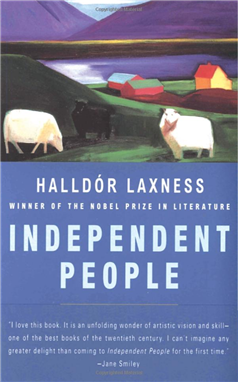Who knew that Iceland had a Nobel Prize winner for literature? I didn’t even notice with his novel in my hands, given to me by my Uncle Fred last summer. I just put it in my pile of books to be read. If I’d known it was so good, I would have paid more attention.
Oddly, I seem to be inadvertently in an islands phase. This is the second book I’ve reviewed recently about Iceland (see my review of Burial Rites), and I have another I will soon review about New Zealand, The Luminaries. (See my review of The Bone People.)
Bjartur Jónsson has worked for the Bailiff’s family for 18 years to earn enough money to buy a small farm and some sheep. He is determined from now on to be beholden to no one else, to be independent. Even though his holding is said to be cursed by the fiend Kolumkilli (Saint Columba) and the witch Gunnvor, Bjartur is not superstitious and refuses to cast a stone on Gunnvor’s cairn to appease her when he first crosses the ridge into his valley. He is determined to make a place for himself and his bride-to-be Rósa on his own efforts.
On his wedding night he has an unpleasant surprise. Someone has already been with Rósa, he claims. At first we’re not certain whether he is being perverse, but one night when Bjartur is out searching for a lost sheep (that Rósa ate out of desperation), Rósa dies in childbirth only a few months after the wedding. Bjartur finds the baby on the edge of death, protected by his bitch sheep dog. Bjartur is a singular character—a lover of the old sagas and a poet, obstinate to the point of stupidity, untrusting, ornery, thinking mostly of his sheep—but he immediately loves this little girl and names her Ásta Sólillja (beloved sun lily).
Although Bjartur soon marries Finna, the woman who comes to care for Ásta Sólillja, and we get to know her and her mother and the couple’s three sons, it is the characters of Bjartur and Ásta Sólillja that dominate the story. Bjartur is so heedless of anything but his own ideas that he refuses anything resembling a gift, even if it would keep his family healthy, and Ásta Sólillja is innocent and gentle as the little flower he calls her.
The time frame of this novel is vague, so we are startled two thirds of the way through to see references to World War I, for the life of these Icelandic farmers seems no different than it would have been in the Middle Ages. Laxness describes a hard, grim existence, where babies die of illness and malnutrition, where Finna lies in bed ill for weeks every winter, where the family lives in one room full of fleas.
This story is not a bleak one, however; rather it is comic, sad, and moving. The novel centers on a rift between Ásta Sólillja and Bjartur. In anger, he throws her out. Although he repents his action, he won’t admit it and stubbornly waits for her to come ask for forgiveness. Well, she will never ask.
Slowly, things begin going wrong for Bjartur. He has already lost his second wife and his oldest son because of obstinacy about a cow. His youngest son Nonni, a brilliantly drawn character whose mother told him he would “sing for the world” (and I think is meant to be Laxness himself) disappears from the novel when he gets a chance to go to America at a young age. Soon Bjartur is left with only his middle son Gvendur, a young man not given to introspection who only knows how to “keep on doing things.”
Along with the story of Bjartur’s family, we learn a bit about the history of Icelandic politics and economy, but the novel centers on this all too human and oddly endearing family. If you decide to read this poetic novel, I think you will have a wonderful and surprising experience. It looks like several of Laxness’s works are out in paperback. I’m going to be buying more.


I’ll definitely look this book and this author up. I think I read that Iceland has the most bookstores per capita?? Thanks for the review!
That’s interesting! I really liked this book.
Sounds interesting. My sister was just there for vacation. I’ll have to ask her if she noticed many bookstores!
I have been looking at your page, Naomi, and see that Michael Crummey has another book out. I loved Galore!
So far I have liked all of Michael Crummey’s novels. I haven’t read any of his short stories or poetry, though, so I can’t vouch for them, but I am sure they are also good.
The only book of his I have run into is Galore, so I will have to look for more.
This sounds like something I would really enjoy! Plus, I don’t think I’ve ever read a novel set in Iceland. That should be remedied. Thanks for the recommendation!
It is a great book! You should also check out Burial Rites, which was good, too, although I think this one is better.
This is on my list, too! I just visited Iceland last spring and they do have a lot of bookstores. They do hold some kind of reading record — I think it might be most books published per capita? Something like that. Anyway, they are a very book-friendly country. 🙂
That’s great! I would like to go sometime, too.
Oh, wow — this one sounds delicious! I’ll have to get it. I also love the idea of an ‘island’ theme to reading — makes me wonder what else would be fun to read…
You might like The Luminaries. It’s a weighty book but I really enjoyed it. Review coming next week!